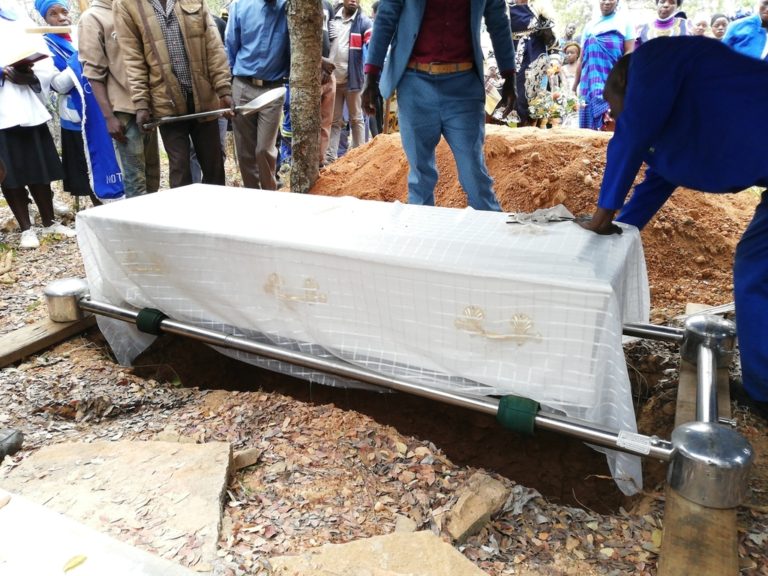Rusape, June 20 — Shingirai Manyengavana (25) opens a white coffin for people to pay their last respect inside a kitchen hut in Denhere Village, in Rusape, 174 kilometers southeast of Harare, the capital of Zimbabwe.
Mourners, inside this kitchen hut, are wearing homemade face masks, of different colors and they are standing about one meter apart.
As part of Zimbabwean culture, the dead should be taken to their rural home where the coffin is put inside a family kitchen hut to spend a night there while people pay their last respect.
Shingirai is here to bury his grandmother, Dorcas Manyengavana, who passed on early this month in Mutare at the age of 72 after battling high blood pressure and diabetes-related diseases for nearly 10 years.
He was here a decade ago to bury his grandfather at an event attended by hundreds of people but this time the environment is different as Zimbabwe, like the rest of the world, is fighting Coronavirus, a respiratory disease.
“We usually have huge gatherings at funerals but this time it is different,” he told Ubuntu Times.
“Many could not attend. We had to make sure that there is a sizable number adhering to Coronavirus regulations.”

The southern African nation has been on ‘indefinite’ lockdown since mid-May to curb the possible spread of Coronavirus that has claimed the lives of seven and infected more than 590 people.
Globally, the respiratory disease has killed over 510,000 people while infecting more than 10 million people, according to Johns Hopkins University.
There is restriction in movement of people in Zimbabwe, putting on a mask is mandatory for everyone in public places, gatherings of more than 50 people are illegal and citizens are being encouraged to observe social distancing.
Zimbabwe is not the only country that has put restrictions on human traffic since the start of the pandemic in March.
Southern African Development Community countries have closed their borders for nonessential human traffic, only cargo and returning residents are allowed to enter.
These Coronavirus measures have forced a shift in Zimbabwe’s funeral culture.
In Zimbabwe, a funeral practice known locally as ‘Kubata maoko’ meaning visiting the grieving family, shaking hands with them while expressing condolences is important amongst the Shona people—the majority in the country.
Now with Coronavirus, this culture risks spreading this respiratory disease, and the Manyengavana family ditched it at their recent funeral.
“We avoided using handshakes. These measures were, however, in conflict with our cultural norms considering that people were used to the normative way of handshaking and consoling each other through hugging,” said Shingirai.
At the gate and all around the house, there were containers filled with water and sanitizers in the form of detergents for hand washing.

James Denhere, who is also the headman in Denhere Village, said most of his villagers were not turning out for funerals since March when the lockdown started in fear of contracting Coronavirus.
“They could not attend because of Coronavirus. Coronavirus is real,” he said.
The late Dorcas Manyengavana has three sons who are working in neighboring South Africa but they failed to attend the burial of their mother.
“I really wanted to attend. At first, I thought it was very inappropriate not to attend but because of the current travel restrictions due to Coronavirus, I made peace with the fact that I can not bury my mother,” Artwell Manyengavana, one of the sons, told Ubuntu Times.
“It is not easy but that is the reality at the moment.”
Usually, when close family members of the deceased are outside the country, the burial is often delayed to buy time for them to arrive.
Barely a month after Dorcas’s death, one of her three sons living in South Africa, Washington Manyengavana, passed on after battling severe headaches for nearly two weeks.

A Zimbabwean prolific writer Oscar Gwiriri said it is of paramount importance in Shona culture that one attends a close relative’s burial, bids farewell with the deceased through body viewing and mourning with others.
“If one fails to attend the funeral for whatever reason, it remains a social and spiritual debt, and worse still the spirit of the deceased may attack him or her in dreams or encountering misfortunes,” said Gwiriri who has penned a number of Zimbabwean cultural and traditional novels.
Prince Mutandi Sibanda, a secretary of education of Zimbabwe National Traditional Healers Association, said Coronavirus has affected African traditional and religious rituals practices especially at funerals, and limiting the number of attendees is against people’s norms and cultural values.
“If one fails to attend funerals of close family members one will be haunted by angry spirits of the dead and might experience bad luck,” he said.
Gwiriri, nevertheless, said safety of the living comes first considering the avenging spirits of the dead may be dealt with later.
Manyengavana family epitomizes the predicament of many Zimbabwean families who have seen a shift in the way funerals are held.
Tanaka Chidora lost his grandmother in early May and some of the family members who were in Harare and those outside the country failed to attend the burial in Masvingo.
He said they also had to shun away some of the cultural practices that could spread Coronavirus at the funeral.
“People were paying their condolences using handshakes. They constantly reminded each other there was Coronavirus out there and it is real,” said Chidora.
Another Zimbabwean writer, Aaron Chiundura Moyo, told Ubuntu Times that the newly adopted cultural practices will continue even after the world wins the fight against Coronavirus.
“This is beyond our control as Zimbabweans. It is changing the lives of many people locally and even beyond the borders. People have already adjusted culture at a funeral due to Coronavirus and I am sure this norm of handshaking will be abandoned even after this global pandemic,” he said.
Tsitsi Nomsa Ngwenya, a Zimbabwean writer, said people are likely going to normalize the new culture as their way of life.
“People may no longer respect the need for attending funerals. Such tragedies, unfortunately, may chart new ways in life and also normalize it. The fact that Coronavirus has made it possible, that may not be difficult for some in future, therefore, breaking our traditional customs,” she said.
















